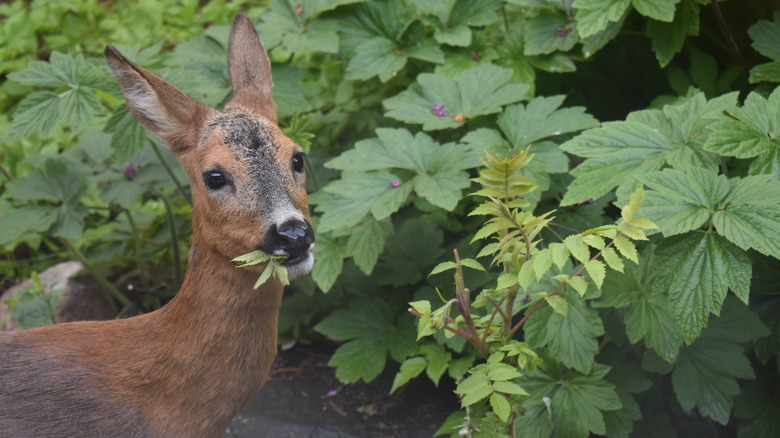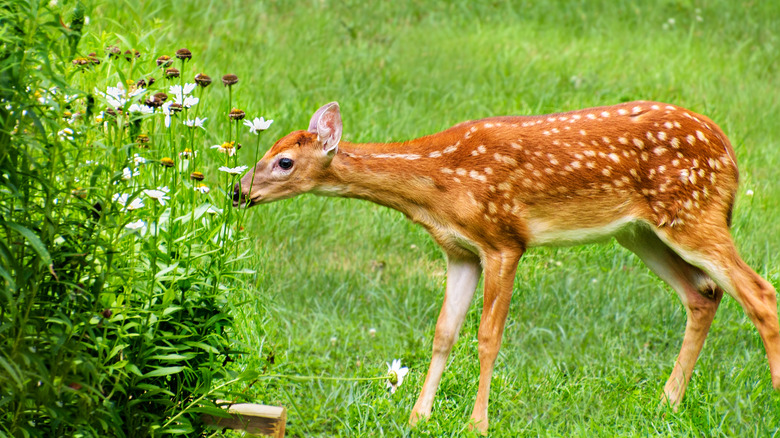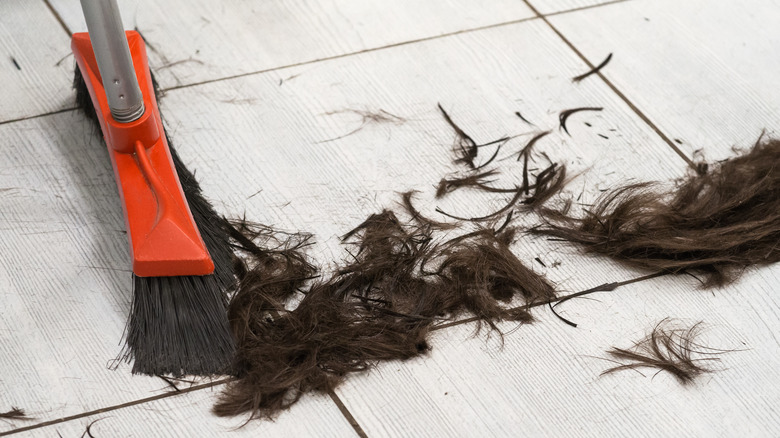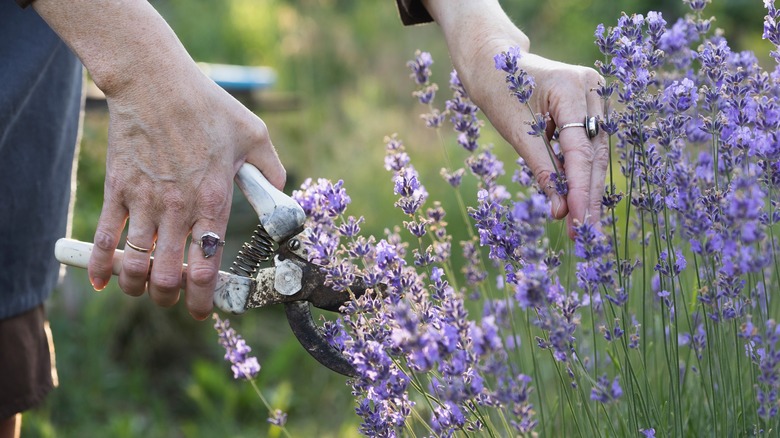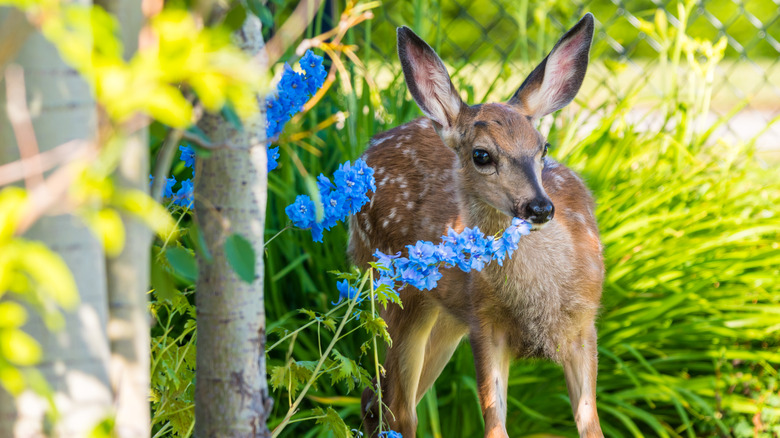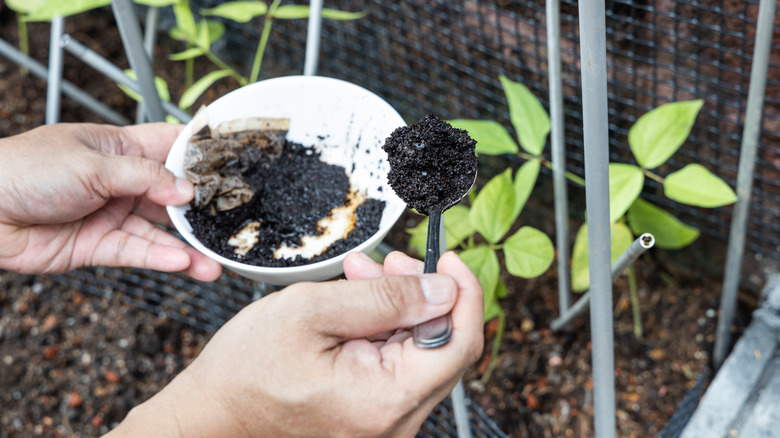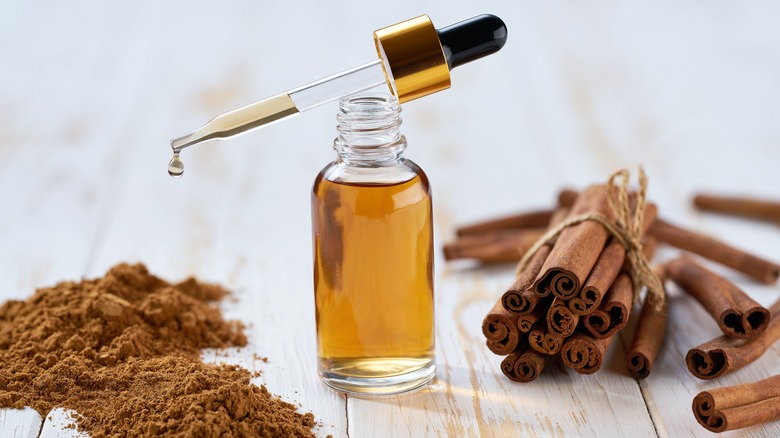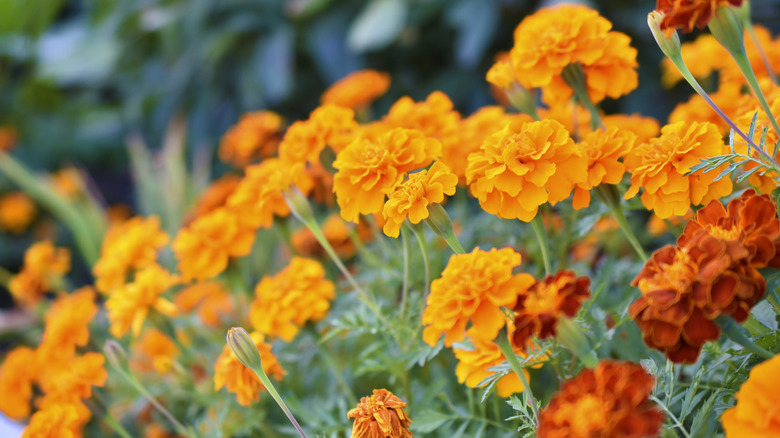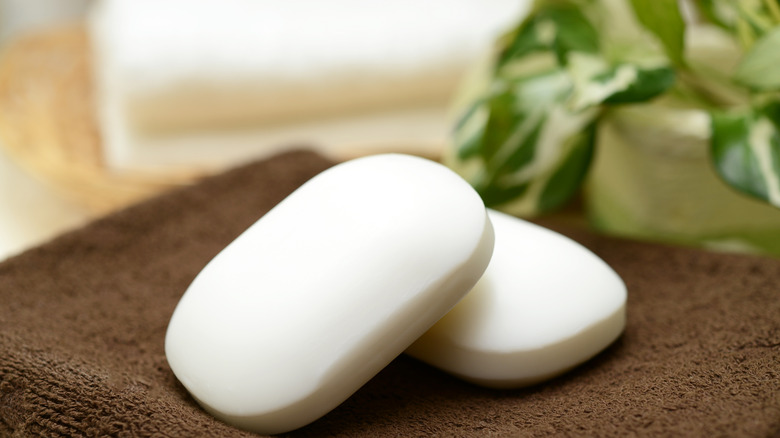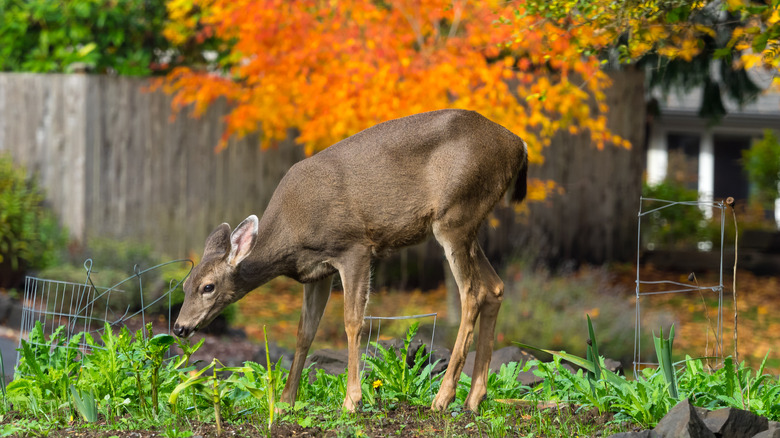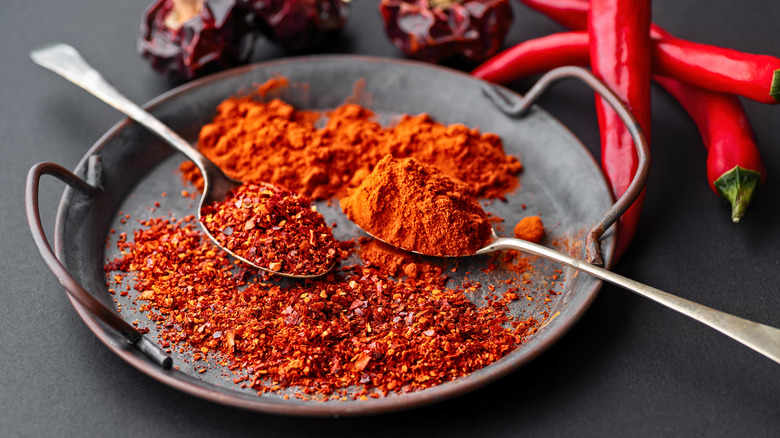12 Natural Ingredients That Can Repel Deer From Your Yard & Garden
We may receive a commission on purchases made from links.
How many times have you glanced outside in the morning to find some unwelcome visitors have ravaged your garden — again? Deer are beautiful and graceful creatures, but that doesn't mean they're welcome in your yard. These voracious eaters can quickly destroy your cherished plants, including hostas, daylilies, tulips, roses, and fruit trees. While you can use chemical repellents to keep deer away, there are other natural methods you can try for a safer, more environmentally-friendly solution.
These natural repellents often include deer-resistant plants, ingredients, and sprays to prevent the animals from feasting on your garden. Most methods center on repelling deer with odors or tastes they don't like. However, keep in mind that natural solutions have limitations, and their effectiveness can vary depending on where you live and the deer population in your area. Plus, hungry deer will fight through most deterrents, including natural ones, when they need to eat. While methods can be a valuable tool in your gardening belt, you may need a variety of strategies to keep your garden green, lush, and deer-free.
Deer can sniff garlic a mile away, and they don't like it
Deer have extremely sensitive noses compared to humans. White-tailed deer, the most common species in North America, have about 60 times the number of olfactory receptors as the average person. Deer use their keen sense of smell to avoid danger and forage for food. When you know what scents they don't like, you can use this knowledge to keep Bambi away from your prized shrubs and flowers.
Like humans, deer have natural aversions to certain smells. Garlic is a common natural ingredient you can use in the garden to repel deer. And, there are many natural repellents you can make with it. You can mix garlic with mint to make an effective two-ingredient homemade spray. Another popular spray recipe combines eggs, chopped garlic, and water. You can also add red pepper sauce to make the spray even more abhorrent to deer. For the best results, start using these repellents before deer find your tulips, hostas, or apple trees. Once they know they can feast in your garden, garlic is less likely to be an effective deterrent. You should also re-apply the spray often, especially after heavy rains, to keep it active.
Rotten eggs might be stinky, but they're good at deterring deer
Few natural products work better than eggs at deterring deer. A study by the U.S. Department of Agriculture found commercial repellents with animal proteins, including eggs, to be among the most effective at repelling deer from gardens. Putrescent whole egg solids are the active ingredient in some commercial pesticides for warding off black- and white-tailed deer. However, you don't need to spend money on commercial products with this ingredient. You can head to your fridge or the grocery store to make your own egg-based repellent instead.
Start by mixing raw eggs with water to create a foamy mixture. Use a ratio of six eggs to one gallon of water. Once you've mixed the egg and water together, leave it outside in the sun for a few hours to putrefy the egg. Then, use a sprayer to apply the repellent to dry plants. Follow these steps and reapply every few weeks. If it rains, re-apply the mixture once the plants have dried.
While this method has had success for many home gardeners, there are a few downsides, too. The smell of rotten eggs may be unpleasant not just to deer, but also to you and your family. Also, you don't want to apply this spray to any plants you plan to eat. If you have shrubs and flowers deer like to eat, however, this common kitchen ingredient can keep them away.
Scare deer from your garden with human hair clippings
Can't stomach the thought of using a stinky concoction in your garden? Human hair may be a more palatable alternative to your deer problem. Deer have a natural fear of humans that surpasses other predators, including coyotes, cougars, and dogs, according to one study. Placing hair in your garden tricks the deer into thinking you're nearby, even where you're inside or away from home.
The next time you get a haircut, ask your barber or hairdresser if you can keep the clippings. Be prepared to explain your request if they give you a funny look. Once you secure the clippings, you can scatter them in your mulch or garden beds. As an added perk, hair makes an effective soil fertilizer because of its micronutrients. Besides scattering hair, another popular method is to hang the clippings throughout your garden. Use pantyhose or cheesecloth to hold the clippings and hang them from bushes or trees that deer enjoy munching on.
This method works best if deer only graze in your garden occasionally. Since it's an area repellent, not a contact repellent, it usually has lower success rates than other strategies. Additionally, if deer are hungry enough, they're unlikely to be deterred by human hair.
Many herbs, like mint and lavender, make a pleasant deterrent
If your garden has become an all-you-can-eat buffet for deer, it may be time for a more permanent solution like incorporating strategic plants into your landscaping. Many herbs, such as mint and lavender, are very aromatic. While you may enjoy their smell, the strong aromas are off-putting to deer. Other common deer-resistant herbs include basil, dill, oregano, sage, thyme, rosemary, parsley, and fennel.
There are a few ways you can use herbs in your garden to keep the deer away from your other greenery. You can plant a border of herbs, such as lavender, around your garden. This border essentially serves as a protective shield for plants that deer may find more appetizing. You can also pair herbs with other plants that deer can't resist, such as hostas.
If you don't have room in your garden to plant herbs, you can grow them in containers and place the pots around your garden. Mint, basil, and lemon balm are some herbs that can thrive in containers. Position them next to your most vulnerable plants to discourage the deer from visiting.
Vinegar is a versatile ingredient for your kitchen and your garden
You may know about the different ways you can use vinegar to clean your kitchen and bathrooms, but did you know you can use it in your garden, too? Deer don't like the smell of vinegar because it's strong and overpowering to them. If they sniff vinegar in your yard, they may decide to keep looking for their next meal. Like other odor repellents, vinegar doesn't work in every situation. But it's worth trying, especially if you already have some sitting in your cupboard.
Start by finding some old kitchen or cleaning rags you no longer use. Soak the rags completely in white vinegar and attach them to stakes. Place the stakes in strategic areas around your garden, such as near vegetable beds. You can also hang the rags from tree branches using rope or twine. If this method works well, soak the rags again every 7 to 10 days to keep the scent fresh.
Don't throw away your coffee grounds if you have a deer problem
You can also look in your kitchen for another effective deer repellent: coffee grounds. If you can't start your day without a cup of coffee, save the grounds and use them to deter deer from your yard or garden. Coffee has a pungent odor that's not as appealing to deer as it may be to you in the mornings. While some gardeners have had mixed results with coffee grounds, it doesn't hurt to try this method or use it in combination with others.
The hardest part of this strategy may be remembering to save your coffee grounds each morning. Keep a ziplock bag or airtight container next to your coffee maker and store the used grounds there. Each week, take the grounds you've collected and sprinkle them in the soil around your plants. If you have enough coffee grounds, you can also create a protective barrier by scattering them around the perimeter of your yard. Repeat this process weekly if you see good results from it. Keep in mind that deer may become used to the smell of coffee if they frequent your yard often. If this happens, rotate coffee grounds with another natural solution.
Got (expired) milk? Use it to repel deer from your yard
Do you have some milk in the fridge that's slightly past its use-by date? Instead of tossing it immediately, use it in your garden to stop deer from chowing down on your plants. Just like you may gag at the scent of rotten milk, deer don't like the smell either. Don't worry: the smell should become tolerable, if not undetectable, to you once it dries after application. (Of course, if you have a weak stomach, you may want to move on to another solution.)
You can make a DIY milk spray using soured milk that's been left out for 24 hours or longer, creating a truly foul smell. If you prefer, you can also make a sour milk repellent by mixing one-half cup of milk with one egg, one teaspoon of cooking oil, one tablespoon of dish detergent, and one gallon of water.
Once you have your stinky solution, spray it around your plants on a sunny day. Small droplets of milk shouldn't harm the organic matter of the soil, but to be safe, you can add a protective layer of mulch before applying the solution. Apply the milk mixture every seven to 10 days and after heavy rains to repulse deer and keep them from eating your foliage.
Tone down gross smells with cinnamon to deter deer
The smell of sour milk or rotten eggs can turn even the most iron stomachs. In many homemade solutions, you can add cinnamon to make the odor more pleasant to you. Like other strong scents, cinnamon can naturally repel deer that want to make a meal out of your shrubs or flowers. Plus, many people enjoy the smell of cinnamon, making it an attractive option for some gardeners.
To make a DIY cinnamon repellent, the Washington Department of Fish and Wildlife recommends combining 20 drops of cinnamon oil with two eggs, one cup of milk, two teaspoons of Tabasco or cayenne pepper, one teaspoon of cooking oil, and one teaspoon of liquid dish soap. Add the mixture to a one-gallon sprayer and top it off with water. Spray the natural deer repellent onto dry plants and reapply every two to four weeks, or sooner if it rains.
It's a good idea to test the spray on a small area before applying it liberally throughout your garden. Additionally, don't use this repellent on your fruits or vegetables. If you find success with this method, remember that deer can become used to smells, so you may need to alternate this repellent with other natural solutions.
Marigolds make a beautiful deer repellent in many yards
Unlike some other natural repellents, marigolds add beauty to your garden while deterring deer at the same time. Deer naturally gravitate toward certain plants, but marigolds have a strong fragrance that repels the animals. Rather than eating marigolds, or other plants around them, deer often choose to move on to the next yard. Additionally, marigolds can keep other garden pests at bay, including rabbits and mosquitoes.
Plant marigolds in your garden to get rid of deer naturally. You can plant the bright blooms around the perimeter, making a wall to protect your other greenery. You can also pair marigolds with other plants as companions to create the same effect. Marigolds come in different varieties and colors, including vibrant hues, such as orange, yellow, copper, gold, and red. For the most part, they're low-maintenance plants, though they need to be in full sun with well-draining soil. Also, you should deadhead old blooms to make way for new growth (and keep their scent strong).
A common bathroom product may be the answer to your deer woes
If you've heard of using soap to discourage deer from entering your garden, you may have dismissed the theory as a myth. However, many gardeners report having success with this natural method. Soap works in the same way as other area repellents. When you place it near plants deer love to eat, they smell the soap and go elsewhere to find their food. At least one study has found that soap appears to be an effective repellent to prevent deer from munching on crops.
The most common method of using soap involves placing bars of it around your garden. Get some inexpensive bars, such as Irish Spring, and place them in mesh bags, stockings, or cheesecloth. Hang the bags in your yard, focusing on trees, bushes, and shrubs that deer like to eat. Another way to use this handy bathroom staple to keep deer away is by grating the soap with a cheese grater and spreading it throughout your garden. It's not a harsh chemical, so it won't harm your plants. After it rains, grate a few more bars of soap to replace any that's washed away.
Make your own fish emulsion (if you can tolerate the smell)
Fish emulsion, which is a liquid fertilizer made from fish byproduct, has many benefits in the garden. It contains the vital nutrients of nitrogen, phosphorus, and potassium, making it an effective fertilizer. Additionally, fish emulsion has valuable micronutrients, such as calcium and sulfur, to improve soil health. Beyond its use for fertilization, fish emulsion may have the added benefit of deterring deer from your garden. It has an extremely strong smell, which makes it unappealing to deer.
You can buy commercial fish fertilizer, such as this option from Amazon, but you can also make your own. Before you start, be warned that making fish emulsion will not be a glamorous process, and you may become overwhelmed by the smell. However, once it's applied outside, the smell should dissipate for you, though deer will continue to be repelled by it. To make the fertilizer, collect raw fish scraps and place them in a bucket. Add some dried leaves, grass clippings, or sawdust and mix thoroughly. Cover the bucket and allow it to sit for a month, aerating the mixture every other day. Once it's ready for use, dilute the emulsion with water and apply it in your garden.
Deer can't handle spice, so use capsaicin to ward them off
Have you ever taken a bite of a spicy dish and immediately wish you hadn't? Deer can also experience this oh-my-gosh-what-was-I-thinking feeling when it comes to capsaicin, a component found in hot peppers. This ingredient works as both an odor and taste repellent to deer. Once they've tasted or smelled it in your garden, they're less likely to return and risk accidentally ingesting it.
While it's generally effective at repelling deer, be careful with this approach. Capsaicin isn't toxic to the animals, but it can irritate their skin or eyes. Additionally, capsaicin can be lethal to bees, spiders, and other beneficial insects. You may want to try other natural deer repellents before resorting to capsaicin in your garden.
If you've exhausted other options, you can make a hot pepper spray using this recipe from the Rhode Island Department of Environmental Management. Mix two teaspoons of hot pepper with one teaspoon of liquid dish soap and one teaspoon of garlic powder. Combine these ingredients with one gallon of water and apply to your plants with a garden sprayer. Like other homemade repellent sprays, re-apply the mixture regularly to continue deterring deer from snacking on your garden.

